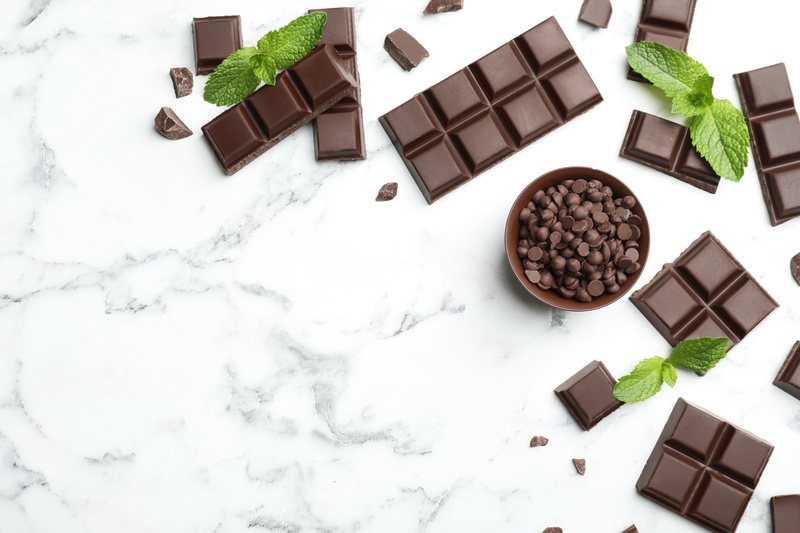People decide to “go vegan” for many reasons: health, religion or spiritual ideologies, environmental concerns, or it might simply be a matter of preference.
Eating only vegan food is a big commitment and takes a shift in lifestyle. While it may seem like you are going to have to give up A LOT (and you will!), a whole new world of possibilities opens up, too. And you don’t have to worry — you can still enjoy delicious food and wonderful, chocolatey treats.
Is Chocolate Vegan?
One thing people wonder about is whether or not chocolate is vegan. A person who is vegan eliminates all animal products from their diet, which includes the obvious things like meat and eggs, but it also includes animal byproducts like dairy (milk and milk byproducts) and even things like honey.
The great news is that (some) chocolate is definitely vegan.
Chocolate in its purest form is technically “plant-based” because it is made from the pod of the cocoa tree. To create chocolate as we know it, cocoa beans are processed and mixed with cocoa butter, sugar, and sometimes soy lecithin and vanilla. These ingredients are all suitable for vegans.
This form of chocolate is commonly called Dark Chocolate, and is quite bitter tasting. The higher the cocoa content, the more bitter it will be. Dark chocolate enthusiasts love the smooth taste and are satisfied with how purely delicious the treat is.
Vegans, however, must avoid milk chocolate since the addition of milk takes it from being vegan-friendly to not at all. Milk chocolate contains ingredients produced by cows, and therefore is not suitable for a vegan diet.
Read Ahead
It is also important to watch for other non-vegan ingredients that might be added, and you can do this by reading the label.
High quality chocolate usually contains only a few pure ingredients but there may be stabilizers or sweeteners that affect whether or not it qualifies as vegan. For example, ingredients that are derived from milk are often added, things like whey, casein, milk fat, and milk solids.
It is also important to watch for flavoured chocolate, which may be produced with milk products. Some safe bets are dark chocolate that has nuts, salt, or fruit added. But again, the only way to be certain is to carefully read the label down to the very last ingredient.
The more ingredients a bar of chocolate has, the riskier it will become for a vegan diet. We recommend eating only high quality dark chocolate with fewer than six ingredients. If you are uncertain about what a product is or don’t recognize it, it is better to be safe than sorry. Avoid cheap chocolate from the corner store as these products are not only non-vegan, they are full of lab-created fillers and stabilizers, artificial flavorings, or low-quality palm oils and other unsavory ingredients.
At Home Vegan Baking
Eating out and buying baked goods makes it hard to know exactly what you are getting when you buy that cookie or cake. But there are plenty of amazing recipes that you can try at home so that you know what is going in the treats you will be enjoying.
Vegan baking with dark chocolate opens up a whole new world of sweet (and relatively healthy) treats. People use beans, avocados, and other savoury ingredients in baking (actually!) to create delicious desserts that have great texture and flavor. It may take some experimenting if you are used to baking with lots of butter (try replacing with apple sauce) and other dairy products, but we assure you, vegan baking can truly be amazing.
Dark Chocolate for Health
In addition to dark chocolate tasting amazing (though it may take a while for you to acquire the taste if you are used to very sweet milk chocolate), dark chocolate has plenty of health benefits.
Studies have shown that a 100-gram bar of 70-85% dark chocolate contains: 11 grams of fiber, 67% of the recommended daily intake (RDI) of iron, 58% of the RDI for magnesium, 89% of the RDI of copper, 98% of the RDI of magnesium.
That 100-gram dark chocolate bar also contains lots of zinc, phosphorous, selenium, potassium. These vital minerals contribute to the overall functioning of the body and are lacking in many diets. Dark chocolate can also help with heart function and may reduce heart disease, and is good for the skin (the largest organ of the body) and the brain. Dark chocolate is found to improve circulation and reduce blood pressure.
Of course, a diet of excessive dark chocolate is not good. Dark chocolate still contains sugar and is high in caffeine, which can aggravate anxiety and lead to other health problems.
In Conclusion
Many brands of chocolate will offer both vegan and non-vegan options so be a careful consumer. The devil is in the details. Reading labels is a good habit to get into whether you are a vegan or not, and the fewer the ingredients, the more whole a food is and the better it is for your health.
If you are accustomed to very sweet milk chocolate, give yourself some time to adjust to the rich new world of dark, vegan chocolate. While the bitter flavor profile might not do it for you at first, we can almost guarantee that you will grow to love it if you give it a chance.
At Totally Chocolate, we pride ourselves on our dark chocolate that is made with care and attention to the quality of ingredients. We know good chocolate from bad, and we are happy to cater to our loyal vegan customers.
If you are vegan and looking for delicious dark chocolate options that suit your dietary restrictions, look no further than our wide array of incredible options.
